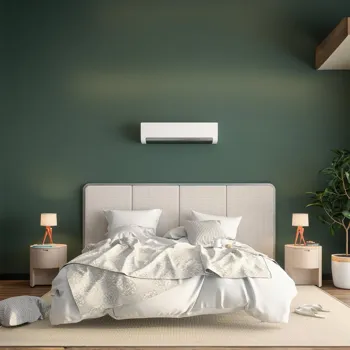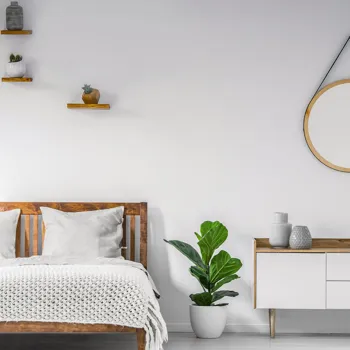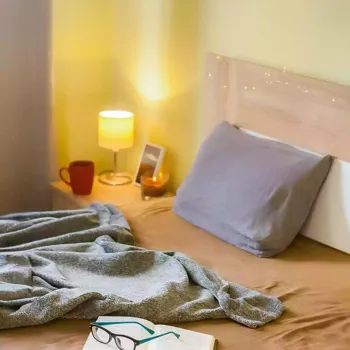Unlock the secrets of sleep hygiene for a healthier you. Discover how simple habits can transform your well-being
In the hustle-bustle of modern life, where deadlines loom and social engagements beckon,
sleep often gets relegated to the bottom of the priority list. We burn the midnight oil, fueled by caffeine and the relentless pursuit of productivity, unknowingly jeopardizing our overall health and well-being.

But what if I told you that the key to a healthier, happier you might lie in something as simple as sleep? That's where 'sleep hygiene' comes in, a set of practices designed to improve your sleep quality and ensure you wake up feeling refreshed and ready to tackle the day.
Prioritize sleep hygiene for better health and wellness
Sleep hygiene isn't about counting sheep or tossing and turning until slumber finally arrives. It's about creating a sleep-conducive environment and adopting habits that promote restful sleep.

Just like maintaining good dental hygiene or practicing regular exercise, prioritizing sleep hygiene is an investment in your physical and mental health. Think of it as a holistic approach to wellness, where a good night's sleep serves as the foundation for a healthier lifestyle.
After all, our bodies use this time to repair tissues, consolidate memories, and regulate hormones - all essential processes for optimal functioning. If you are not giving your body the needed break , it will soon start showing some effects sooner or later.
And trust me, you don't want that to arrive.
Consistent sleep schedule and bedtime routine key for good sleep
So, what exactly constitutes good sleep hygiene? It's a multi-faceted approach that involves several key elements. First and foremost, consistency is crucial.

Try to go to bed and wake up at the same time every day, even on weekends, to regulate your body's natural sleep-wake cycle, also known as the circadian rhythm. This internal clock governs various physiological processes, including hormone release, body temperature, and alertness levels.
By maintaining a consistent sleep schedule, you're essentially training your body to anticipate sleep and wakefulness, making it easier to fall asleep and wake up feeling refreshed. Creating a relaxing bedtime routine is another important aspect of sleep hygiene.
Establish a calming bedtime routine for better sleep
This could involve taking a warm bath, reading a book, or listening to calming music. The goal is to wind down and mentally prepare for sleep. Avoid stimulating activities like watching television, working on your computer, or engaging in intense conversations right before bed.
These activities can increase alertness and make it harder to fall asleep. Additionally, ensure that your bedroom is conducive to sleep. Create a dark, quiet, and cool environment.
Use blackout curtains to block out external light, earplugs to minimize noise, and adjust the thermostat to a comfortable temperature. A comfortable mattress and pillows are also essential for a good night's sleep. It can cause neck pain and soreness if the pillow is not right.
Do not drink tea or coffee before going to bed.
Establish a calming bedtime routine for better sleep quality
Creating a bedtime routine is like giving your body a signal that it's time to wind down and prepare for sleep. Think of it as a ritual that helps you transition from the stressors of the day to a state of relaxation and tranquility.

This could involve taking a warm bath or shower, which helps to relax your muscles and lower your body temperature, signaling to your brain that it's time to sleep. Reading a book, especially something calming and non-stimulating, can also be a great way to unwind.
Avoid thrillers or suspense novels that might keep you on edge. Listening to calming music, such as classical or nature sounds, can also promote relaxation and help you fall asleep faster. The key is to find activities that you enjoy and that help you feel calm and relaxed.
Avoid alcohol, caffeine, nicotine before bed; optimize sleep environment
In addition to these habits, it's important to be mindful of what you consume before bed. Avoid alcohol, caffeine, and nicotine, as these substances can interfere with sleep.

While alcohol might initially make you feel drowsy, it can disrupt your sleep later in the night, leading to fragmented sleep and early awakenings. Caffeine, a stimulant found in coffee, tea, and some soft drinks, can keep you awake for hours, as most people know.
Nicotine, found in cigarettes, can also interfere with sleep, causing restlessness and frequent awakenings. It's best to avoid these substances altogether, especially in the hours leading up to bedtime. Also, ensure that your bedroom is conducive to sleep.
Create a dark, quiet, and cool environment. Use blackout curtains to block out external light, earplugs to minimize noise, and adjust the thermostat to a comfortable temperature.
Regular exercise improves sleep, avoid strenuous workouts before bed, seek medical help for sleep disorders
Apart from these, regular exercise can improve sleep quality, but avoid strenuous workouts close to bedtime. It's best to exercise earlier in the day to allow your body time to wind down before sleep.
Spending time outdoors during the day can also help regulate your circadian rhythm, as exposure to natural light helps to keep your body clock in sync. It's also important to address any underlying medical conditions that might be interfering with your sleep.
Conditions like sleep apnea, restless legs syndrome, and chronic pain can disrupt sleep and prevent you from getting a good night's rest. If you suspect that you have any of these conditions, consult a doctor for diagnosis and treatment. Sometimes, sleeping patterns can signify a deeper problem.
Practicing mindfulness and relaxation for better sleep
Practicing mindfulness and relaxation are like giving your mind a break from the constant stream of thoughts and worries that can keep you awake at night.
Mindfulness involves paying attention to the present moment without judgment, while relaxation techniques, such as deep breathing and progressive muscle relaxation, can help you calm your body and mind.
Incorporating these practices into your daily routine can help reduce stress and anxiety, making it easier to fall asleep and stay asleep. It has proven to be very effective for those suffering to sleeplessness. Consistent practice is the key to success with mindfulness and relaxation.
Don't get discouraged if you don't see results right away. With time and effort, you can learn to quiet your mind and create a sense of inner peace that promotes restful sleep.














